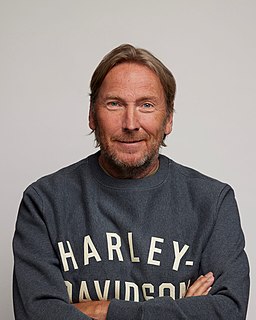Top 65 Quotes & Sayings by Jochen Zeitz
Explore popular quotes and sayings by a German businessman Jochen Zeitz.
Last updated on April 13, 2025.
The old way of doing 'good business' was based on the principle, 'the ends justifies the means.' In the future, good business will invoke 'the means justifying the ends.' The E P&L can already serve as an important tool to help this shift in commerce from generating profits with collateral damages to profits with collateral benefits.
I call upon governments to start supporting companies to use more sustainable materials in their products instead of continuing with antiquated incentives, such as import duties on synthetic materials that are in principle much higher compared with those placed on leather goods regardless of the environmental footprint.
We decided that sports, lifestyle and fashion were three elements that could be mixed together to a very unique formula. That's what we did: make Puma a very sports-fashion brand when, at the times, everybody talked about sports and sports performance and functionality. We said, 'Well, it's about more.'



















